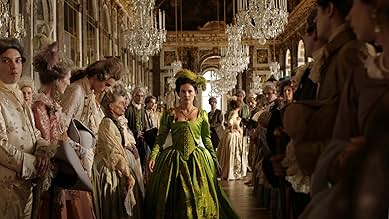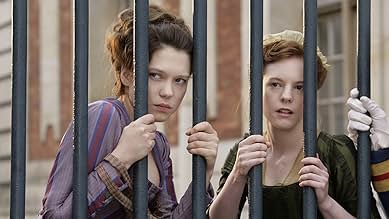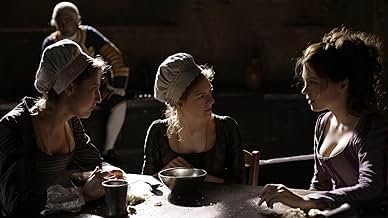IMDb-BEWERTUNG
6,2/10
9340
IHRE BEWERTUNG
Ein Blick auf die platonische Beziehung zwischen Marie Antoinette und einer ihrer Leserinnen in den ersten Tagen der Französischen Revolution.Ein Blick auf die platonische Beziehung zwischen Marie Antoinette und einer ihrer Leserinnen in den ersten Tagen der Französischen Revolution.Ein Blick auf die platonische Beziehung zwischen Marie Antoinette und einer ihrer Leserinnen in den ersten Tagen der Französischen Revolution.
- Regie
- Drehbuch
- Hauptbesetzung
- Auszeichnungen
- 6 Gewinne & 12 Nominierungen insgesamt
Julie-Marie Parmentier
- La servante Honorine Aubert
- (as Julie-Marie Parmentier de la Comédie Française)
Marthe Guérin Caufman
- La domestique Alice
- (as Marthe Caufman)
Hervé Pierre
- L'abbé Hérissé
- (as Hervé Pierre de La Comédie Française)
Empfohlene Bewertungen
A marvelous film. Very rarely does a film based on fact, especially a story as infamous as this one, succeed at creating such tension despite the fact that everyone knows pretty much what is going on and what will happen (United 93 springs to mind). As it is director Benoît Jacquot and his team have done a incredible job in capturing the confusion, uncertainty and pure dread that those living at Versailles in the final days of the Monarchy must have felt. Seriously, anyone who's ever dismissed period dramas and films based on true stories as "stuffy", slow and boring should give this one a shot. The cast is also exceptionally strong, led by a group of immensely talented female performers. The only downside is really the ending, unfortunately, slightly anticlimactic and a bit of a let down.
Written and directed by Benoît Jacquot and based on the novel by Chantal Thomas, Farewell, My Queen explores the death throes of the French monarchy over a period of three days in July, 1789. Set in the Palace of Versailles at the beginning of the French Revolution, Sidonie (Lea Seydoux), known as the reader for Queen Marie-Antoinette (Diane Kruger), is responsible for selecting books and reading them aloud to the queen. Because of her closeness to the monarch, she is able to act as a spy, securing information about events taking place inside and outside the palace, pressing selected servants for information, and eavesdropping on conversations to gather the most up-to-date gossip to pass along to Marie.
The film is seen from Sidonie's point of view, a vantage point that illuminates the sharp social divisions inside the palace with the servants living in crowded rat-infested quarters, and the royals dwelling in opulent accommodations. Lea Seydoux delivers a powerful performance as the devoted servant of the queen, conveying an air of mystery about who she really is in a way that adds to her allure. Kruger portrays Marie-Antoinette as sensual and hedonistic and there is a hint of more than Platonism in the way she interacts with both Sidonie and the Duchess de Polignac (Virginie Ledoyen), a relationship that tests Sidonie's loyalty.
On the morning of July 15th, news spreads rapidly that the king had been awakened at two in the morning. No one knows the reason, but fear spreads throughout the court. If the king is ill, who will protect those totally dependent on the nobles who control their lives? It is soon revealed, however, that the king is not ill, but that a mob has stormed the Bastille and a revolt has begun against the aristocracy. Little information is available. Rumors abound based only on conversations whispered in the hallways and the servant's quarters. When the King travels to Paris and the Queen decides against an escape to Metz, an aura of inevitably descends on the Palace and the nobles begin to abandon ship, competing for places on the coaches seeking a safe haven.
Antoinette makes every effort to continue with business as usual, looking at magazines to admire new styles and colors for the coming season, paying scant attention to the fact that her name is number one in a list of 300 targets for the guillotine. Fearful of losing her only connection to the world, Sidonie is willing to risk the ultimate sacrifice if it is in the queen's best interest. Even though Farewell, My Queen is historically questionable and may hold us at arms length emotionally, it provides a fresh view of events that we know about only from history books or stuffy costume dramas.
Jacquot captures the authenticity of time and place and also the human side of the power struggle. Unfortunately, the film pays little attention to the issues that led to the revolt, never mentioning the abuse of power by the monarchy. Indeed, the Revolution serves only as a backdrop for the story which is more about seduction, loyalty, and betrayal than social upheaval. Rather than making a statement that is relevant for our times, the intricacies of sexual intrigue and love triangles dominate the film, titillating rather than persuading, and making the goings on difficult to care about.
The film is seen from Sidonie's point of view, a vantage point that illuminates the sharp social divisions inside the palace with the servants living in crowded rat-infested quarters, and the royals dwelling in opulent accommodations. Lea Seydoux delivers a powerful performance as the devoted servant of the queen, conveying an air of mystery about who she really is in a way that adds to her allure. Kruger portrays Marie-Antoinette as sensual and hedonistic and there is a hint of more than Platonism in the way she interacts with both Sidonie and the Duchess de Polignac (Virginie Ledoyen), a relationship that tests Sidonie's loyalty.
On the morning of July 15th, news spreads rapidly that the king had been awakened at two in the morning. No one knows the reason, but fear spreads throughout the court. If the king is ill, who will protect those totally dependent on the nobles who control their lives? It is soon revealed, however, that the king is not ill, but that a mob has stormed the Bastille and a revolt has begun against the aristocracy. Little information is available. Rumors abound based only on conversations whispered in the hallways and the servant's quarters. When the King travels to Paris and the Queen decides against an escape to Metz, an aura of inevitably descends on the Palace and the nobles begin to abandon ship, competing for places on the coaches seeking a safe haven.
Antoinette makes every effort to continue with business as usual, looking at magazines to admire new styles and colors for the coming season, paying scant attention to the fact that her name is number one in a list of 300 targets for the guillotine. Fearful of losing her only connection to the world, Sidonie is willing to risk the ultimate sacrifice if it is in the queen's best interest. Even though Farewell, My Queen is historically questionable and may hold us at arms length emotionally, it provides a fresh view of events that we know about only from history books or stuffy costume dramas.
Jacquot captures the authenticity of time and place and also the human side of the power struggle. Unfortunately, the film pays little attention to the issues that led to the revolt, never mentioning the abuse of power by the monarchy. Indeed, the Revolution serves only as a backdrop for the story which is more about seduction, loyalty, and betrayal than social upheaval. Rather than making a statement that is relevant for our times, the intricacies of sexual intrigue and love triangles dominate the film, titillating rather than persuading, and making the goings on difficult to care about.
It's July, 1789, and French citizenry is starting to revolt. Queen Marie Antoninette (Diane Kruger) is hold up at Château de Versailles with her court and her book reader (Léa Seydoux). When the news of the storming of the Bastille reaches them, panic sets in and the King's entourage start slipping away.
It's fascinating to see the various reaction as rumors start to spread. Léa Seydoux is great as the doe-eyed true believer. It is disconcerting to know her true naivety even though she has no idea. It's the source of the tension, but it's also infuriating. Diane Kruger is fine, but I thought that it wasn't quite big enough. However, the climax was just right.
It's fascinating to see the various reaction as rumors start to spread. Léa Seydoux is great as the doe-eyed true believer. It is disconcerting to know her true naivety even though she has no idea. It's the source of the tension, but it's also infuriating. Diane Kruger is fine, but I thought that it wasn't quite big enough. However, the climax was just right.
I love a good costume drama, but anything that includes Marie-Antoinette is apparently bound to be a repetition of the same old clichés over and over.
We get it, she was completely disconnected from reality, careless and pampered and bored and tended to for every bit a normal human being does itself. Age-old cliché that Marie-Antoinette was nothing more than a self-absorbed bimbo? Check.
We get it also, the French Revolution was an immense shock to the royalty and aristocracy; not only did they not see it coming, they didn't think it was possible at all to see the end of their reign. Again, the tried-and-true representation of 18th century French aristocrats as clueless morons? Check.
So, after reinstating the same backdrop again (and again), this version puts forth a bigger focus on rumours of a lesbian love affair the queen was accused of having back then, because that would make the movie so unique.. or not. The story was already a snorefest on paper so let's toss in some sexual material to spice it up in spite of one's better judgement? Check.
The list goes on.
The photo direction is beautiful, the costumes and decors are gorgeous, the actors are all excellent, all this movie is missing is an actual story worthy of your attention. A real shame.
We get it, she was completely disconnected from reality, careless and pampered and bored and tended to for every bit a normal human being does itself. Age-old cliché that Marie-Antoinette was nothing more than a self-absorbed bimbo? Check.
We get it also, the French Revolution was an immense shock to the royalty and aristocracy; not only did they not see it coming, they didn't think it was possible at all to see the end of their reign. Again, the tried-and-true representation of 18th century French aristocrats as clueless morons? Check.
So, after reinstating the same backdrop again (and again), this version puts forth a bigger focus on rumours of a lesbian love affair the queen was accused of having back then, because that would make the movie so unique.. or not. The story was already a snorefest on paper so let's toss in some sexual material to spice it up in spite of one's better judgement? Check.
The list goes on.
The photo direction is beautiful, the costumes and decors are gorgeous, the actors are all excellent, all this movie is missing is an actual story worthy of your attention. A real shame.
For the next few years, it must be assumed that any film featuring a popular uprising will attract lazy comparisons to the Arab Spring. The wild waters of revolution run swift in Benoit Jacquot's "Farewell, My Queen", set in the days of July, 1789. Over a wet week in France, starving Parisians storm the symbol of state tyranny, the Bastille, seizing guns and ammunition. Protesters issue a list of demands, calling for the beheadings of nearly 300 influential figures. The de facto signs of regime change are everywhere. Dead rats float in the Grand Canal in Versaille; mosquitoes terrorize the members of the Royal household. Marie Antoinette (Diane Kruger), the Queen of France, however, has escapism on her mind – she sits in bed, skim-reading the latest fashion pages.
In this task, she is aided by a number of ladies-in-waiting and her reader, Sidonie Laborde (Lea Seydoux). The young woman is called to run to the palace library and return with books and plays she reads aloud to the queen. We learn she is a member of the queen's inner circle and somewhat infatuated with her employer. She performs her duties with a mixture of fear, envy and respect. When the stench of revolution is impossible to ignore, she is told she will be guided to safety. Understandably, she feels more than a little betrayed when the queen orders her to impersonate a fleeing aristocrat, Gabrielle de Polignac, who will accompany her, dressed as a servant. If she is captured, Laborde risks death, while Polignac will abscond to safety.
This could all be familiar territory – Sofia Coppola's "Marie Antoinette" (2006) took a distinctly sweet-toothed approach to the French Revolution, imprisoning Kirsten Dunst behind tiers of artisan cakes. In Coppola's film, the French royals behaved like party-goers on an episode of MTV's "My Super Sweet 16". "Farewell, My Queen", which is based on a novel by Chantal Thomas, isn't confection of the same variety. This dimly lit and low budget film marks the end of the fantasy world of Versailles, its gilded halls, jeweled furniture and costumed courtiers. The Royal staff bow and curtsy at every available opportunity – in their spare time, they trade gossip about the private indiscretions of their employers and idly speculate the future of post-revolutionary France.
Unfortunately, the inner workings of the court of Versailles simply aren't any match for the layered politics that define teenage life on "My Super Sweet 16". While Coppola's film was candy floss masquerading as history, "Farewell, My Queen" succeeds in laboring every aspect of daily life at the Royal court. We are told, time and time again, there lurks intrigue behind every palace wall – most of it remains frustratingly off screen. At one point, I found myself thinking Laborde's chores were no different from the experiences of any gap year student – and considerably less hedonistic.
The end, when it arrives, is all too predictable. As members of the royal household are attacked on the streets of Paris, the occupants of Versaille decide to flee. As the royals leave for the last time, their carriages bursting with furniture and jewels, the staff is told "the King will now check the temperature of the throne room". Ice-cold, I would imagine. Not unlike Jacquot's French revolution.
In this task, she is aided by a number of ladies-in-waiting and her reader, Sidonie Laborde (Lea Seydoux). The young woman is called to run to the palace library and return with books and plays she reads aloud to the queen. We learn she is a member of the queen's inner circle and somewhat infatuated with her employer. She performs her duties with a mixture of fear, envy and respect. When the stench of revolution is impossible to ignore, she is told she will be guided to safety. Understandably, she feels more than a little betrayed when the queen orders her to impersonate a fleeing aristocrat, Gabrielle de Polignac, who will accompany her, dressed as a servant. If she is captured, Laborde risks death, while Polignac will abscond to safety.
This could all be familiar territory – Sofia Coppola's "Marie Antoinette" (2006) took a distinctly sweet-toothed approach to the French Revolution, imprisoning Kirsten Dunst behind tiers of artisan cakes. In Coppola's film, the French royals behaved like party-goers on an episode of MTV's "My Super Sweet 16". "Farewell, My Queen", which is based on a novel by Chantal Thomas, isn't confection of the same variety. This dimly lit and low budget film marks the end of the fantasy world of Versailles, its gilded halls, jeweled furniture and costumed courtiers. The Royal staff bow and curtsy at every available opportunity – in their spare time, they trade gossip about the private indiscretions of their employers and idly speculate the future of post-revolutionary France.
Unfortunately, the inner workings of the court of Versailles simply aren't any match for the layered politics that define teenage life on "My Super Sweet 16". While Coppola's film was candy floss masquerading as history, "Farewell, My Queen" succeeds in laboring every aspect of daily life at the Royal court. We are told, time and time again, there lurks intrigue behind every palace wall – most of it remains frustratingly off screen. At one point, I found myself thinking Laborde's chores were no different from the experiences of any gap year student – and considerably less hedonistic.
The end, when it arrives, is all too predictable. As members of the royal household are attacked on the streets of Paris, the occupants of Versaille decide to flee. As the royals leave for the last time, their carriages bursting with furniture and jewels, the staff is told "the King will now check the temperature of the throne room". Ice-cold, I would imagine. Not unlike Jacquot's French revolution.
WUSSTEST DU SCHON:
- WissenswertesIn this movie, Diane Kruger speaks French with a German/Austrian accent - which is undoubtedly how the Austrian-born Marie Antoinette would have spoken herself.
- PatzerOn several occasions when soldiers are marching through the main and side gates of Versailles, and also when Sidonie goes to Le Petite Trianon for the first time and falls into a puddle, you can clearly see the very 21st century anti-terrorism concrete security barriers and bollards flanking the gates.
- Zitate
Agathe-Sidonie Laborde: In a way, Your Majesty, you're asking me to go as bait.
La reine Marie Antoinette: An ugly word for a pretty mouth!
Agathe-Sidonie Laborde: Words are all I possess. I wield them well.
- VerbindungenReferenced in Parole de cinéaste: Benoît Jacquot (2017)
Top-Auswahl
Melde dich zum Bewerten an und greife auf die Watchlist für personalisierte Empfehlungen zu.
- How long is Farewell, My Queen?Powered by Alexa
Details
- Erscheinungsdatum
- Herkunftsländer
- Offizielle Standorte
- Sprachen
- Auch bekannt als
- Farewell, My Queen
- Drehorte
- Produktionsfirmen
- Weitere beteiligte Unternehmen bei IMDbPro anzeigen
Box Office
- Bruttoertrag in den USA und Kanada
- 1.597.998 $
- Eröffnungswochenende in den USA und in Kanada
- 72.100 $
- 15. Juli 2012
- Weltweiter Bruttoertrag
- 6.366.835 $
- Laufzeit1 Stunde 40 Minuten
- Farbe
- Sound-Mix
- Seitenverhältnis
- 2.35 : 1
Zu dieser Seite beitragen
Bearbeitung vorschlagen oder fehlenden Inhalt hinzufügen

Oberste Lücke
By what name was Leb wohl, meine Königin! (2012) officially released in India in English?
Antwort

































